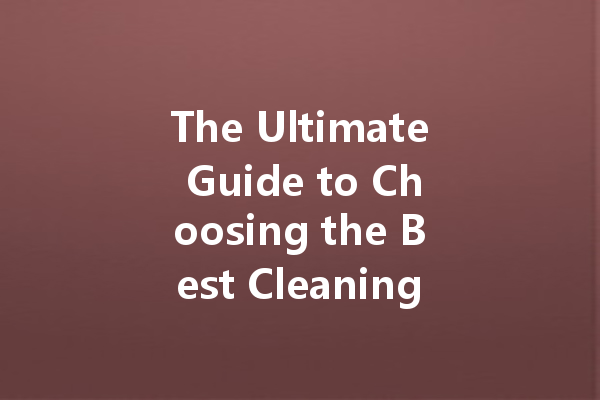Choosing the right cleaning agents for your business can have a significant impact on cleanliness, safety, and overall professionalism. This comprehensive guide will help you navigate the different types of cleaning agents available, the considerations to bear in mind, and how to effectively select the best products for your specific business needs.
Comprendre les différents types de produits de nettoyage
Cleaning agents can vary widely depending on their intended use and formulation. Here, we break down the most common types of cleaning agents you are likely to encounter:
Détergents
Detergents are specially formulated cleaning agents designed to break down dirt and grease. They work by reducing the surface tension of water, making it easier to remove stubborn stains. There are various types, including laundry detergents, dishwashing detergents, and all-purpose cleaners.
Désinfectants
Disinfectants are used to kill bacteria and viruses on surfaces, making them essential in environments that prioritize hygiene, such as hospitals and food service establishments. When selecting disinfectants, consider whether they are required to meet specific regulatory standards for efficacy.
Solvants
Solvents are substances that dissolve other materials. They are typically used to clean or prepare surfaces for various applications. Common solvents include alcohol, acetone, and mineral spirits. When using solvents, ensure proper ventilation and safety precautions, as some can emit harmful fumes.
Abrasifs
Abrasive cleaners contain small, tough particles that help remove stubborn grime from surfaces. They are often used on hard surfaces, such as tiles and sinks. However, they should be used cautiously, as they can scratch softer surfaces.
Nettoyants enzymatiques
These cleaners use natural enzymes to break down organic matter, making them particularly effective for cleaning biohazardous materials or pet stains. They are environmentally friendly and safe for most surfaces.
Factors to Consider When Selecting Cleaning Agents
When choosing cleaning agents for your business, it’s essential to consider several factors to ensure both effectiveness and safety.
Application Area
Consider where the cleaning agents will be used. Different areas may have unique requirements. For example, cleaning agents used in kitchens must meet food safety standards, while those used in industrial settings need to be robust enough to handle heavy grime.
Impact sur l'environnement
Opt for eco-friendly cleaning agents whenever possible. These products minimize environmental impact without sacrificing effectiveness. Look for labels indicating biodegradable ingredients and sustainable sourcing.
Safety and Compliance
Ensure that the cleaning agents you select comply with local and national safety regulations. Check for safety data sheets to understand potential hazards, required personal protective equipment (PPE), and proper handling instructions.
Efficacy
Evaluate the effectiveness of the cleaning agents you are considering. Conduct demonstrations or trial runs, if possible, to see how well they handle the types of dirt and grime typical in your environment.

Budget
Cleaning agents can vary dramatically in price. It’s crucial to balance cost with quality. While opting for cheaper options may seem enticing, they may not deliver the necessary results, leading to more significant costs in the long run.
The Process of Choosing the Right Cleaning Agents
Once you’ve identified the factors to consider, you can start the process of selecting cleaning agents for your business.
Research
Start with thorough research. Look for reputable brands, read reviews, and consult industry resources. Some manufacturers provide comparisons of their products against competitors, which can be helpful.
Sampling
If possible, request samples from potential suppliers. This allows you to test their products in the actual environment where they will be used and determine their effectiveness firsthand.
Consult with Employees
Involve your cleaning staff in the decision-making process. They can provide valuable input on the ease of use, effectiveness, and safety concerns regarding various cleaning agents.
Training
Ensure that your staff is well-trained in the proper use of selected cleaning agents. Understanding how to dilute, apply, and store products correctly will promote safety and effectiveness.
Building Relationships with Suppliers
Establishing strong relationships with suppliers can provide numerous benefits, including better pricing, more reliable delivery schedules, and access to the latest products.
Evaluate Supplier Credentials
When selecting a supplier, consider their reputation within the industry and whether they provide sufficient support and resources. A reliable supplier should offer guidance on the best cleaning agents for your specific needs and be open to answering questions.
Negotiate Terms
Don’t hesitate to negotiate terms, including pricing and delivery schedules. Building a long-term relationship with your supplier can lead to favorable terms and discounts over time.
Continuous Assessment
Regularly assess the effectiveness of the cleaning agents you are using. Collect feedback from cleaning staff and monitor conditions to ensure optimal results. Be open to trying new products if the effectiveness of current agents diminishes or standards change.
Conclusion
Choosing the right cleaning agents for your business involves understanding the different types of products available, considering your unique application areas, and making informed choices based on effectiveness, safety, and environmental impact. By following the steps outlined in this guide, you can ensure a clean, safe, and professional environment that reflects well on your business. Regular evaluation of your choices will further enhance your operations and maintain high standards of cleanliness in your workspace.
